BTEC HND Unit 14 Tour Operations Management Report Analysis
VerifiedAdded on 2020/06/06
|15
|4833
|29
Report
AI Summary
This report delves into the intricacies of tour operations management, examining the various stages involved in developing holiday plans, from gathering evidence to promotion strategies, including the use of Gantt charts for timescale management. It explores different methods of contracting, such as fixed contracts and sale-only contracts, and analyzes the selling price of a holiday package, considering costs like accommodation, transportation, and profit margins, using Thomas Cook as a case study. The report also evaluates planning decisions for brochure preparation, contrasting traditional brochures with modern alternatives, and discussing the suitability of different distribution methods. Furthermore, it assesses strategic and tactical decisions made by tour operators, providing a comprehensive overview of the industry's operational aspects.
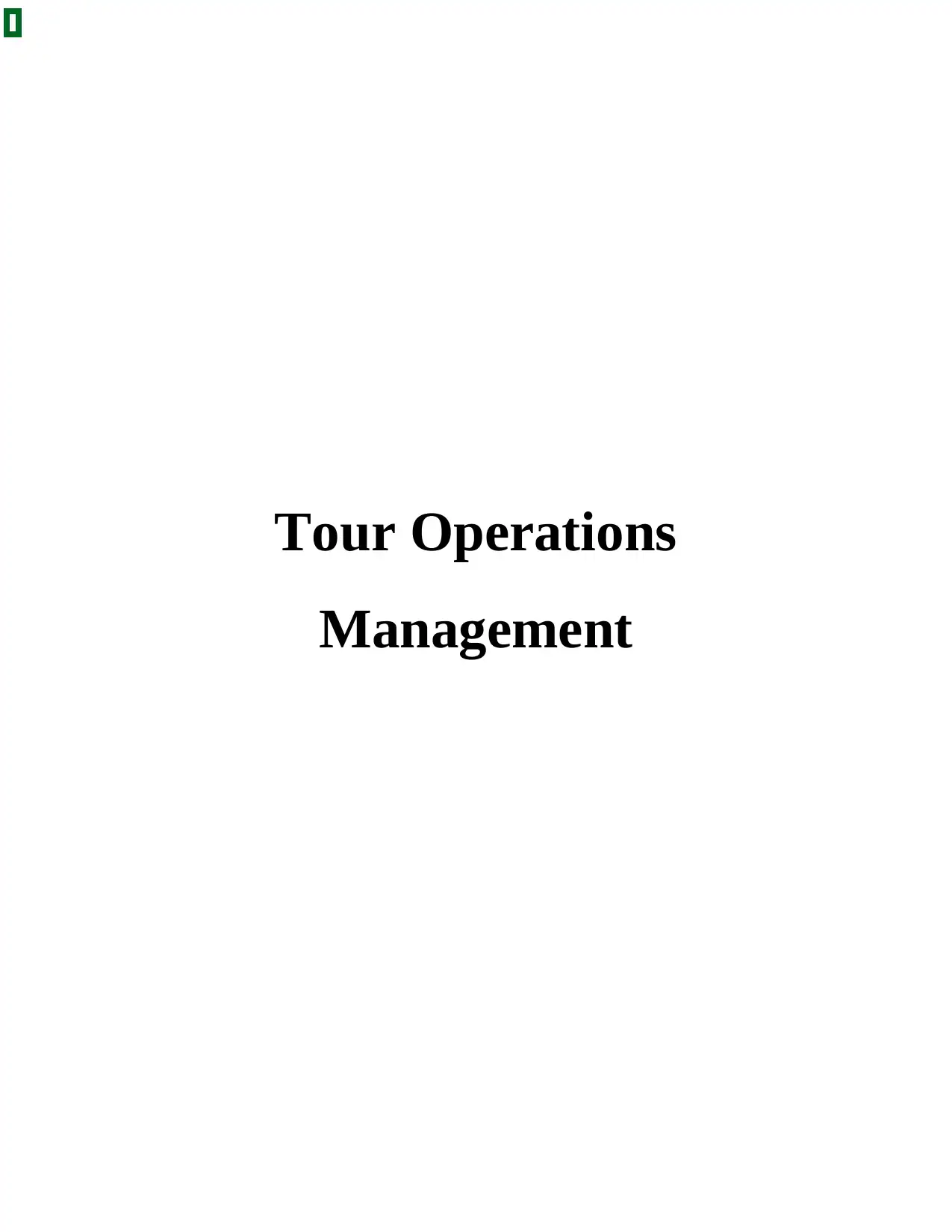
Tour Operations
Management
Management
Paraphrase This Document
Need a fresh take? Get an instant paraphrase of this document with our AI Paraphraser
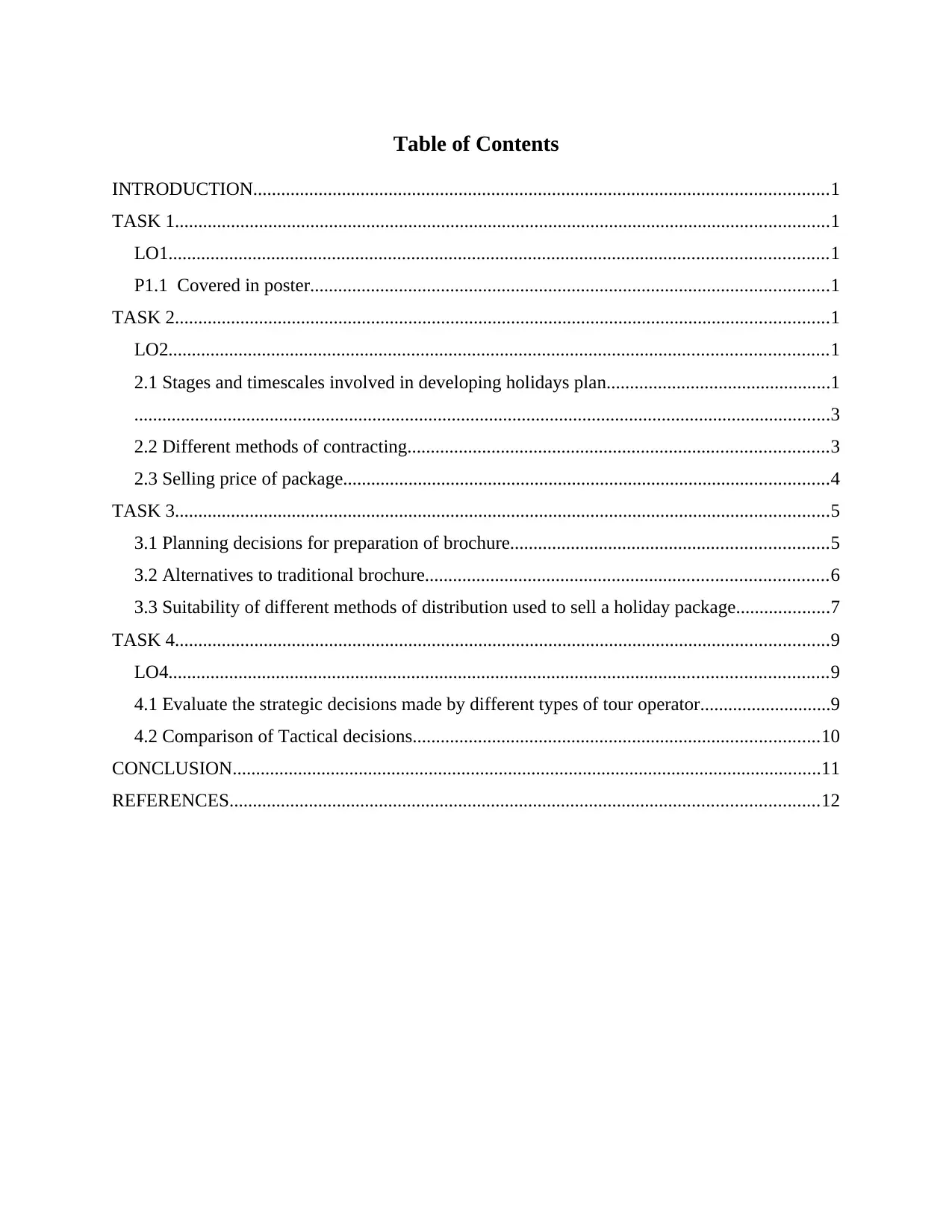
Table of Contents
INTRODUCTION...........................................................................................................................1
TASK 1............................................................................................................................................1
LO1.............................................................................................................................................1
P1.1 Covered in poster...............................................................................................................1
TASK 2............................................................................................................................................1
LO2.............................................................................................................................................1
2.1 Stages and timescales involved in developing holidays plan................................................1
.....................................................................................................................................................3
2.2 Different methods of contracting..........................................................................................3
2.3 Selling price of package........................................................................................................4
TASK 3............................................................................................................................................5
3.1 Planning decisions for preparation of brochure....................................................................5
3.2 Alternatives to traditional brochure......................................................................................6
3.3 Suitability of different methods of distribution used to sell a holiday package....................7
TASK 4............................................................................................................................................9
LO4.............................................................................................................................................9
4.1 Evaluate the strategic decisions made by different types of tour operator............................9
4.2 Comparison of Tactical decisions.......................................................................................10
CONCLUSION..............................................................................................................................11
REFERENCES..............................................................................................................................12
INTRODUCTION...........................................................................................................................1
TASK 1............................................................................................................................................1
LO1.............................................................................................................................................1
P1.1 Covered in poster...............................................................................................................1
TASK 2............................................................................................................................................1
LO2.............................................................................................................................................1
2.1 Stages and timescales involved in developing holidays plan................................................1
.....................................................................................................................................................3
2.2 Different methods of contracting..........................................................................................3
2.3 Selling price of package........................................................................................................4
TASK 3............................................................................................................................................5
3.1 Planning decisions for preparation of brochure....................................................................5
3.2 Alternatives to traditional brochure......................................................................................6
3.3 Suitability of different methods of distribution used to sell a holiday package....................7
TASK 4............................................................................................................................................9
LO4.............................................................................................................................................9
4.1 Evaluate the strategic decisions made by different types of tour operator............................9
4.2 Comparison of Tactical decisions.......................................................................................10
CONCLUSION..............................................................................................................................11
REFERENCES..............................................................................................................................12
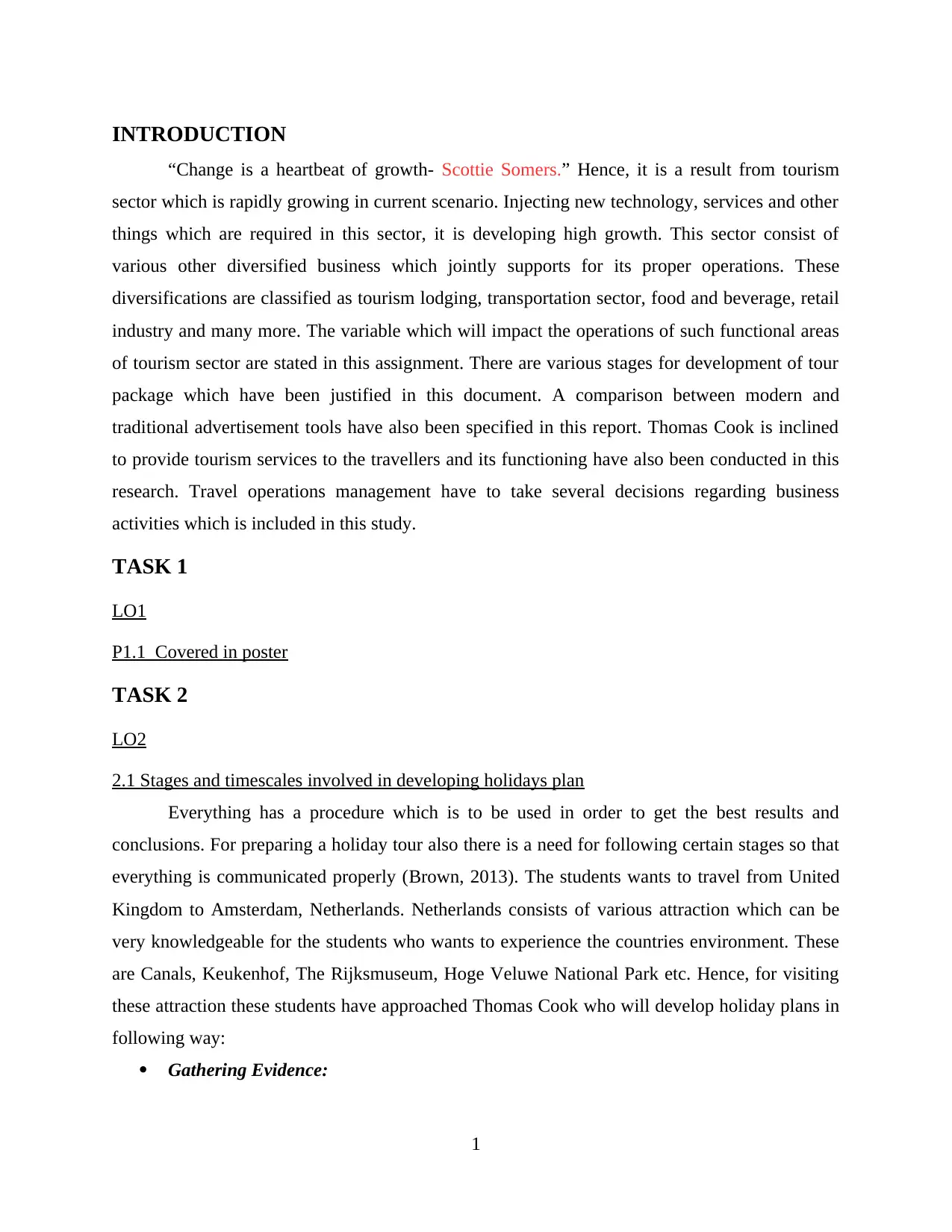
INTRODUCTION
“Change is a heartbeat of growth- Scottie Somers.” Hence, it is a result from tourism
sector which is rapidly growing in current scenario. Injecting new technology, services and other
things which are required in this sector, it is developing high growth. This sector consist of
various other diversified business which jointly supports for its proper operations. These
diversifications are classified as tourism lodging, transportation sector, food and beverage, retail
industry and many more. The variable which will impact the operations of such functional areas
of tourism sector are stated in this assignment. There are various stages for development of tour
package which have been justified in this document. A comparison between modern and
traditional advertisement tools have also been specified in this report. Thomas Cook is inclined
to provide tourism services to the travellers and its functioning have also been conducted in this
research. Travel operations management have to take several decisions regarding business
activities which is included in this study.
TASK 1
LO1
P1.1 Covered in poster
TASK 2
LO2
2.1 Stages and timescales involved in developing holidays plan
Everything has a procedure which is to be used in order to get the best results and
conclusions. For preparing a holiday tour also there is a need for following certain stages so that
everything is communicated properly (Brown, 2013). The students wants to travel from United
Kingdom to Amsterdam, Netherlands. Netherlands consists of various attraction which can be
very knowledgeable for the students who wants to experience the countries environment. These
are Canals, Keukenhof, The Rijksmuseum, Hoge Veluwe National Park etc. Hence, for visiting
these attraction these students have approached Thomas Cook who will develop holiday plans in
following way:
Gathering Evidence:
1
“Change is a heartbeat of growth- Scottie Somers.” Hence, it is a result from tourism
sector which is rapidly growing in current scenario. Injecting new technology, services and other
things which are required in this sector, it is developing high growth. This sector consist of
various other diversified business which jointly supports for its proper operations. These
diversifications are classified as tourism lodging, transportation sector, food and beverage, retail
industry and many more. The variable which will impact the operations of such functional areas
of tourism sector are stated in this assignment. There are various stages for development of tour
package which have been justified in this document. A comparison between modern and
traditional advertisement tools have also been specified in this report. Thomas Cook is inclined
to provide tourism services to the travellers and its functioning have also been conducted in this
research. Travel operations management have to take several decisions regarding business
activities which is included in this study.
TASK 1
LO1
P1.1 Covered in poster
TASK 2
LO2
2.1 Stages and timescales involved in developing holidays plan
Everything has a procedure which is to be used in order to get the best results and
conclusions. For preparing a holiday tour also there is a need for following certain stages so that
everything is communicated properly (Brown, 2013). The students wants to travel from United
Kingdom to Amsterdam, Netherlands. Netherlands consists of various attraction which can be
very knowledgeable for the students who wants to experience the countries environment. These
are Canals, Keukenhof, The Rijksmuseum, Hoge Veluwe National Park etc. Hence, for visiting
these attraction these students have approached Thomas Cook who will develop holiday plans in
following way:
Gathering Evidence:
1
⊘ This is a preview!⊘
Do you want full access?
Subscribe today to unlock all pages.

Trusted by 1+ million students worldwide
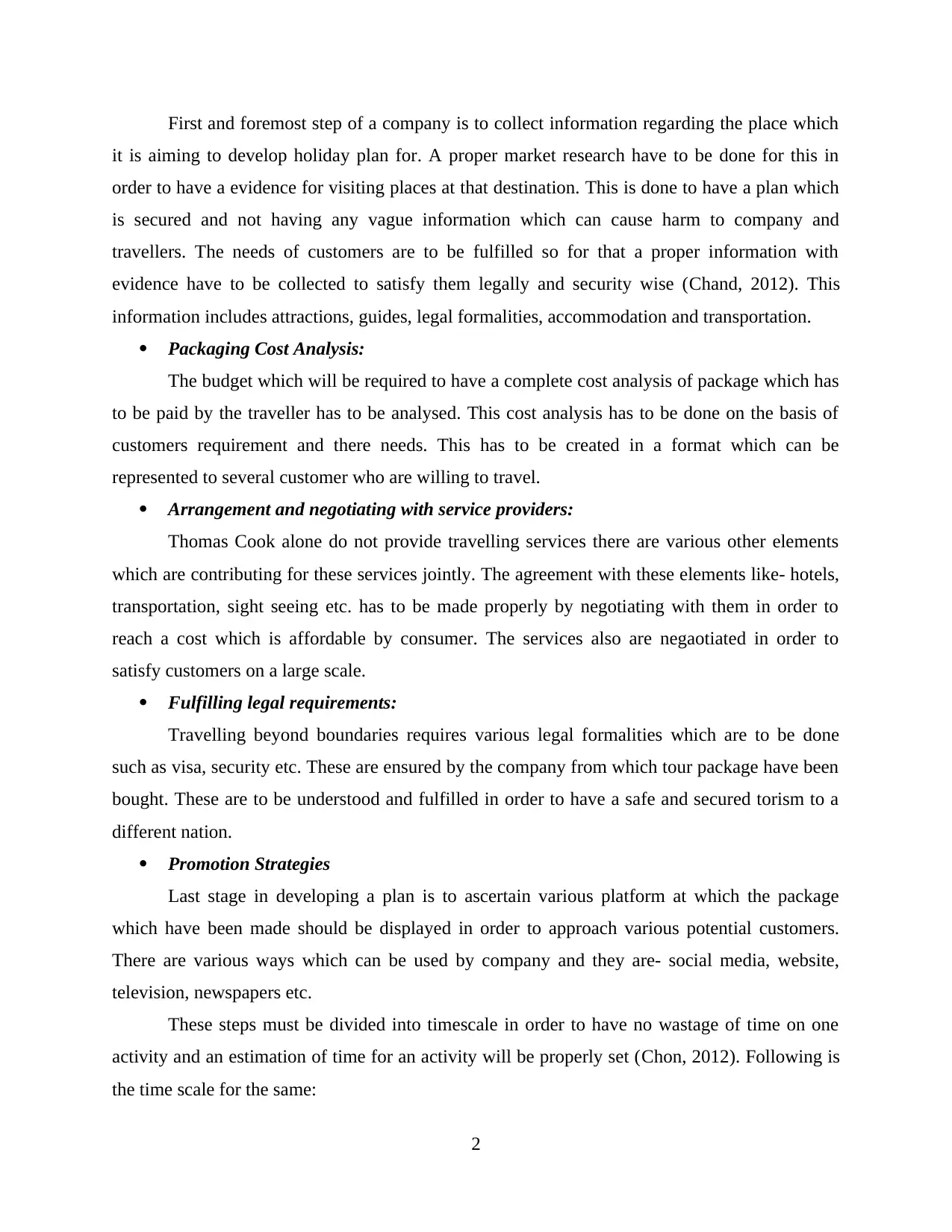
First and foremost step of a company is to collect information regarding the place which
it is aiming to develop holiday plan for. A proper market research have to be done for this in
order to have a evidence for visiting places at that destination. This is done to have a plan which
is secured and not having any vague information which can cause harm to company and
travellers. The needs of customers are to be fulfilled so for that a proper information with
evidence have to be collected to satisfy them legally and security wise (Chand, 2012). This
information includes attractions, guides, legal formalities, accommodation and transportation.
Packaging Cost Analysis:
The budget which will be required to have a complete cost analysis of package which has
to be paid by the traveller has to be analysed. This cost analysis has to be done on the basis of
customers requirement and there needs. This has to be created in a format which can be
represented to several customer who are willing to travel.
Arrangement and negotiating with service providers:
Thomas Cook alone do not provide travelling services there are various other elements
which are contributing for these services jointly. The agreement with these elements like- hotels,
transportation, sight seeing etc. has to be made properly by negotiating with them in order to
reach a cost which is affordable by consumer. The services also are negaotiated in order to
satisfy customers on a large scale.
Fulfilling legal requirements:
Travelling beyond boundaries requires various legal formalities which are to be done
such as visa, security etc. These are ensured by the company from which tour package have been
bought. These are to be understood and fulfilled in order to have a safe and secured torism to a
different nation.
Promotion Strategies
Last stage in developing a plan is to ascertain various platform at which the package
which have been made should be displayed in order to approach various potential customers.
There are various ways which can be used by company and they are- social media, website,
television, newspapers etc.
These steps must be divided into timescale in order to have no wastage of time on one
activity and an estimation of time for an activity will be properly set (Chon, 2012). Following is
the time scale for the same:
2
it is aiming to develop holiday plan for. A proper market research have to be done for this in
order to have a evidence for visiting places at that destination. This is done to have a plan which
is secured and not having any vague information which can cause harm to company and
travellers. The needs of customers are to be fulfilled so for that a proper information with
evidence have to be collected to satisfy them legally and security wise (Chand, 2012). This
information includes attractions, guides, legal formalities, accommodation and transportation.
Packaging Cost Analysis:
The budget which will be required to have a complete cost analysis of package which has
to be paid by the traveller has to be analysed. This cost analysis has to be done on the basis of
customers requirement and there needs. This has to be created in a format which can be
represented to several customer who are willing to travel.
Arrangement and negotiating with service providers:
Thomas Cook alone do not provide travelling services there are various other elements
which are contributing for these services jointly. The agreement with these elements like- hotels,
transportation, sight seeing etc. has to be made properly by negotiating with them in order to
reach a cost which is affordable by consumer. The services also are negaotiated in order to
satisfy customers on a large scale.
Fulfilling legal requirements:
Travelling beyond boundaries requires various legal formalities which are to be done
such as visa, security etc. These are ensured by the company from which tour package have been
bought. These are to be understood and fulfilled in order to have a safe and secured torism to a
different nation.
Promotion Strategies
Last stage in developing a plan is to ascertain various platform at which the package
which have been made should be displayed in order to approach various potential customers.
There are various ways which can be used by company and they are- social media, website,
television, newspapers etc.
These steps must be divided into timescale in order to have no wastage of time on one
activity and an estimation of time for an activity will be properly set (Chon, 2012). Following is
the time scale for the same:
2
Paraphrase This Document
Need a fresh take? Get an instant paraphrase of this document with our AI Paraphraser
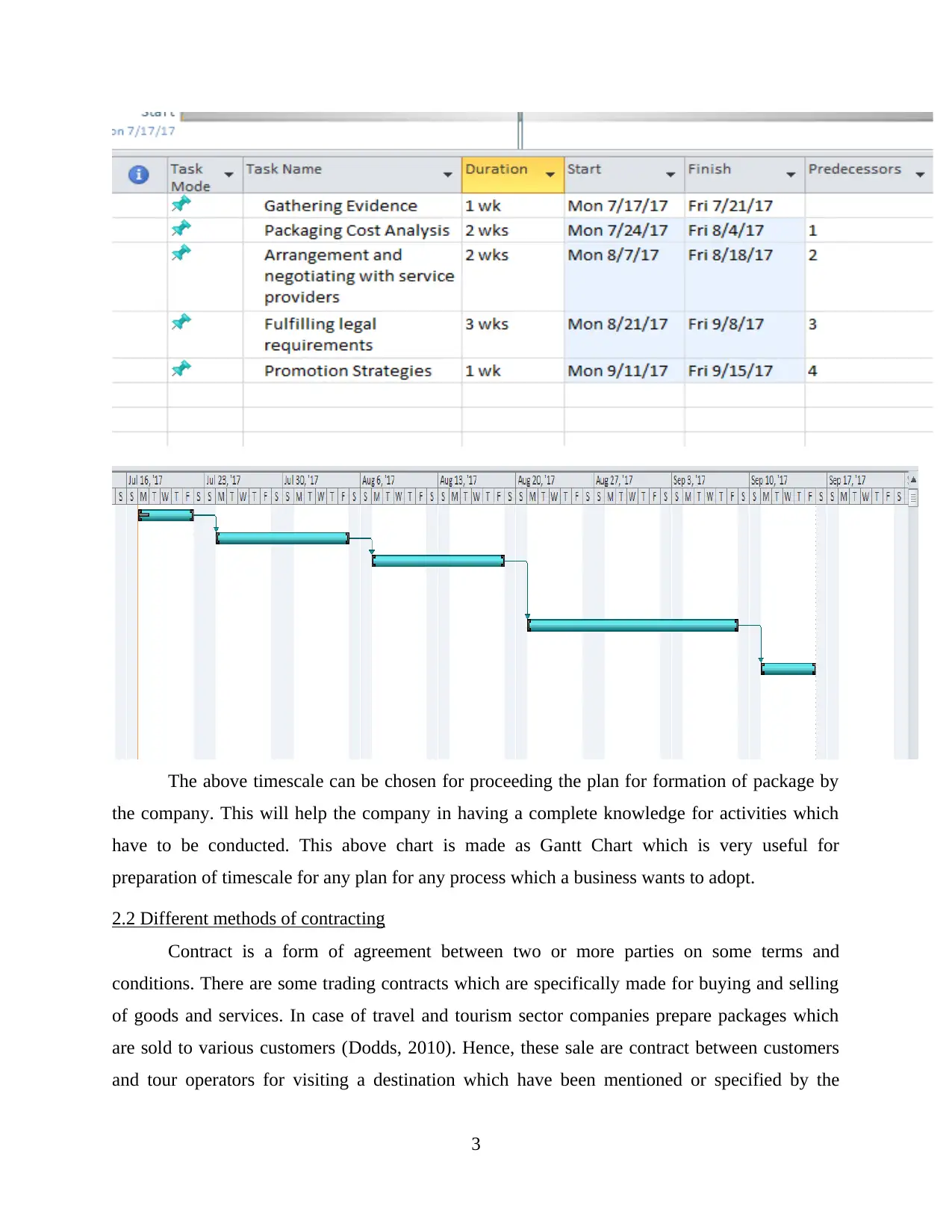
The above timescale can be chosen for proceeding the plan for formation of package by
the company. This will help the company in having a complete knowledge for activities which
have to be conducted. This above chart is made as Gantt Chart which is very useful for
preparation of timescale for any plan for any process which a business wants to adopt.
2.2 Different methods of contracting
Contract is a form of agreement between two or more parties on some terms and
conditions. There are some trading contracts which are specifically made for buying and selling
of goods and services. In case of travel and tourism sector companies prepare packages which
are sold to various customers (Dodds, 2010). Hence, these sale are contract between customers
and tour operators for visiting a destination which have been mentioned or specified by the
3
the company. This will help the company in having a complete knowledge for activities which
have to be conducted. This above chart is made as Gantt Chart which is very useful for
preparation of timescale for any plan for any process which a business wants to adopt.
2.2 Different methods of contracting
Contract is a form of agreement between two or more parties on some terms and
conditions. There are some trading contracts which are specifically made for buying and selling
of goods and services. In case of travel and tourism sector companies prepare packages which
are sold to various customers (Dodds, 2010). Hence, these sale are contract between customers
and tour operators for visiting a destination which have been mentioned or specified by the
3
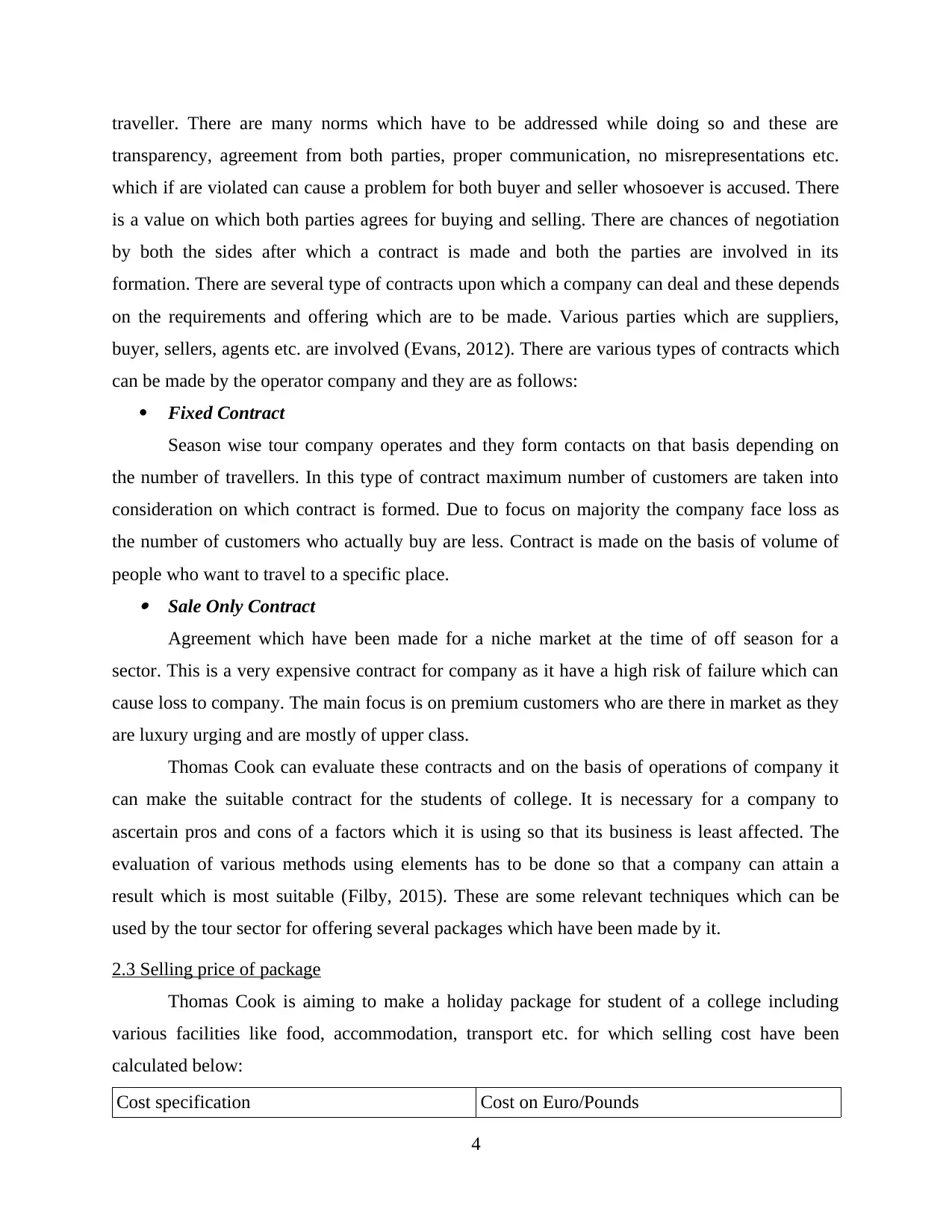
traveller. There are many norms which have to be addressed while doing so and these are
transparency, agreement from both parties, proper communication, no misrepresentations etc.
which if are violated can cause a problem for both buyer and seller whosoever is accused. There
is a value on which both parties agrees for buying and selling. There are chances of negotiation
by both the sides after which a contract is made and both the parties are involved in its
formation. There are several type of contracts upon which a company can deal and these depends
on the requirements and offering which are to be made. Various parties which are suppliers,
buyer, sellers, agents etc. are involved (Evans, 2012). There are various types of contracts which
can be made by the operator company and they are as follows:
Fixed Contract
Season wise tour company operates and they form contacts on that basis depending on
the number of travellers. In this type of contract maximum number of customers are taken into
consideration on which contract is formed. Due to focus on majority the company face loss as
the number of customers who actually buy are less. Contract is made on the basis of volume of
people who want to travel to a specific place. Sale Only Contract
Agreement which have been made for a niche market at the time of off season for a
sector. This is a very expensive contract for company as it have a high risk of failure which can
cause loss to company. The main focus is on premium customers who are there in market as they
are luxury urging and are mostly of upper class.
Thomas Cook can evaluate these contracts and on the basis of operations of company it
can make the suitable contract for the students of college. It is necessary for a company to
ascertain pros and cons of a factors which it is using so that its business is least affected. The
evaluation of various methods using elements has to be done so that a company can attain a
result which is most suitable (Filby, 2015). These are some relevant techniques which can be
used by the tour sector for offering several packages which have been made by it.
2.3 Selling price of package
Thomas Cook is aiming to make a holiday package for student of a college including
various facilities like food, accommodation, transport etc. for which selling cost have been
calculated below:
Cost specification Cost on Euro/Pounds
4
transparency, agreement from both parties, proper communication, no misrepresentations etc.
which if are violated can cause a problem for both buyer and seller whosoever is accused. There
is a value on which both parties agrees for buying and selling. There are chances of negotiation
by both the sides after which a contract is made and both the parties are involved in its
formation. There are several type of contracts upon which a company can deal and these depends
on the requirements and offering which are to be made. Various parties which are suppliers,
buyer, sellers, agents etc. are involved (Evans, 2012). There are various types of contracts which
can be made by the operator company and they are as follows:
Fixed Contract
Season wise tour company operates and they form contacts on that basis depending on
the number of travellers. In this type of contract maximum number of customers are taken into
consideration on which contract is formed. Due to focus on majority the company face loss as
the number of customers who actually buy are less. Contract is made on the basis of volume of
people who want to travel to a specific place. Sale Only Contract
Agreement which have been made for a niche market at the time of off season for a
sector. This is a very expensive contract for company as it have a high risk of failure which can
cause loss to company. The main focus is on premium customers who are there in market as they
are luxury urging and are mostly of upper class.
Thomas Cook can evaluate these contracts and on the basis of operations of company it
can make the suitable contract for the students of college. It is necessary for a company to
ascertain pros and cons of a factors which it is using so that its business is least affected. The
evaluation of various methods using elements has to be done so that a company can attain a
result which is most suitable (Filby, 2015). These are some relevant techniques which can be
used by the tour sector for offering several packages which have been made by it.
2.3 Selling price of package
Thomas Cook is aiming to make a holiday package for student of a college including
various facilities like food, accommodation, transport etc. for which selling cost have been
calculated below:
Cost specification Cost on Euro/Pounds
4
⊘ This is a preview!⊘
Do you want full access?
Subscribe today to unlock all pages.

Trusted by 1+ million students worldwide
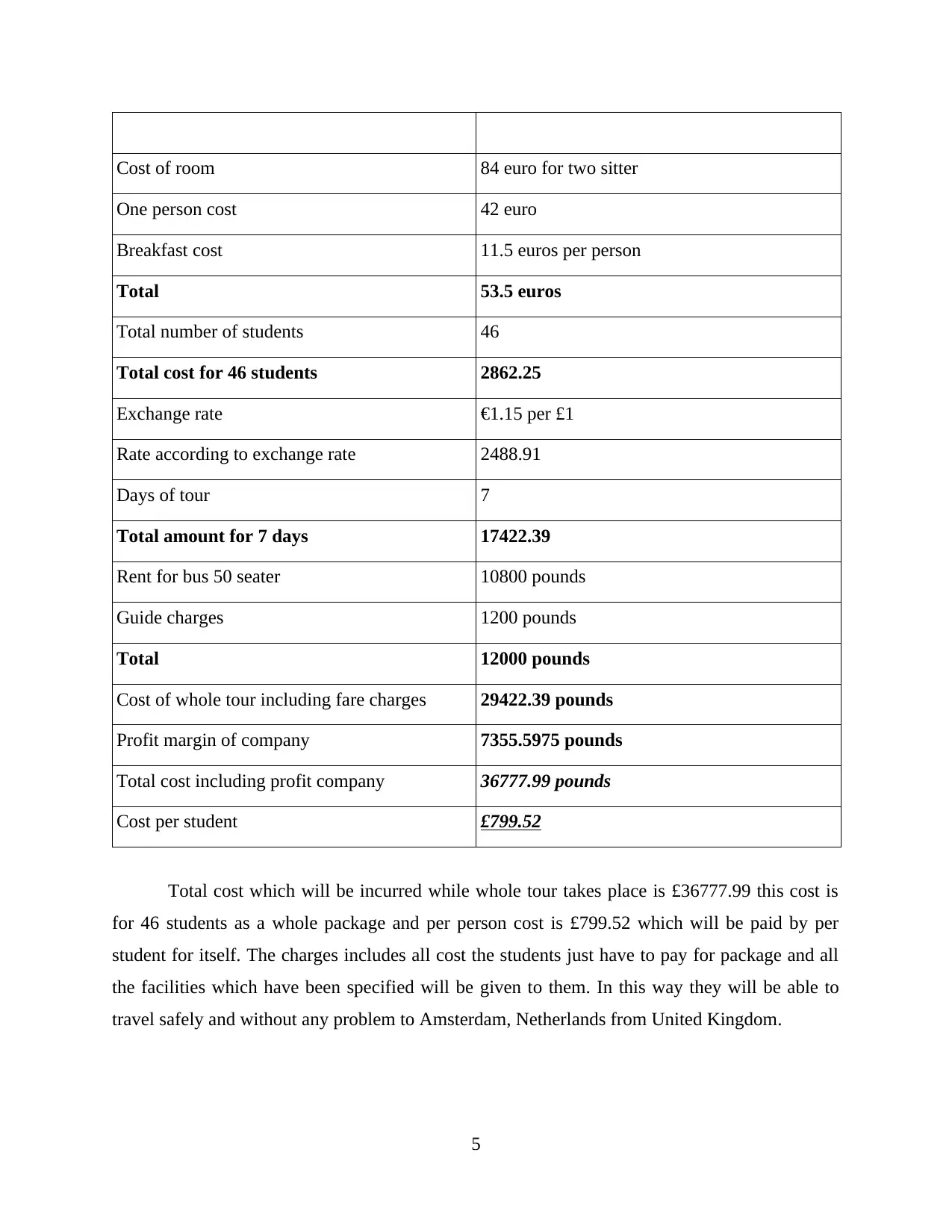
Cost of room 84 euro for two sitter
One person cost 42 euro
Breakfast cost 11.5 euros per person
Total 53.5 euros
Total number of students 46
Total cost for 46 students 2862.25
Exchange rate €1.15 per £1
Rate according to exchange rate 2488.91
Days of tour 7
Total amount for 7 days 17422.39
Rent for bus 50 seater 10800 pounds
Guide charges 1200 pounds
Total 12000 pounds
Cost of whole tour including fare charges 29422.39 pounds
Profit margin of company 7355.5975 pounds
Total cost including profit company 36777.99 pounds
Cost per student £799.52
Total cost which will be incurred while whole tour takes place is £36777.99 this cost is
for 46 students as a whole package and per person cost is £799.52 which will be paid by per
student for itself. The charges includes all cost the students just have to pay for package and all
the facilities which have been specified will be given to them. In this way they will be able to
travel safely and without any problem to Amsterdam, Netherlands from United Kingdom.
5
One person cost 42 euro
Breakfast cost 11.5 euros per person
Total 53.5 euros
Total number of students 46
Total cost for 46 students 2862.25
Exchange rate €1.15 per £1
Rate according to exchange rate 2488.91
Days of tour 7
Total amount for 7 days 17422.39
Rent for bus 50 seater 10800 pounds
Guide charges 1200 pounds
Total 12000 pounds
Cost of whole tour including fare charges 29422.39 pounds
Profit margin of company 7355.5975 pounds
Total cost including profit company 36777.99 pounds
Cost per student £799.52
Total cost which will be incurred while whole tour takes place is £36777.99 this cost is
for 46 students as a whole package and per person cost is £799.52 which will be paid by per
student for itself. The charges includes all cost the students just have to pay for package and all
the facilities which have been specified will be given to them. In this way they will be able to
travel safely and without any problem to Amsterdam, Netherlands from United Kingdom.
5
Paraphrase This Document
Need a fresh take? Get an instant paraphrase of this document with our AI Paraphraser
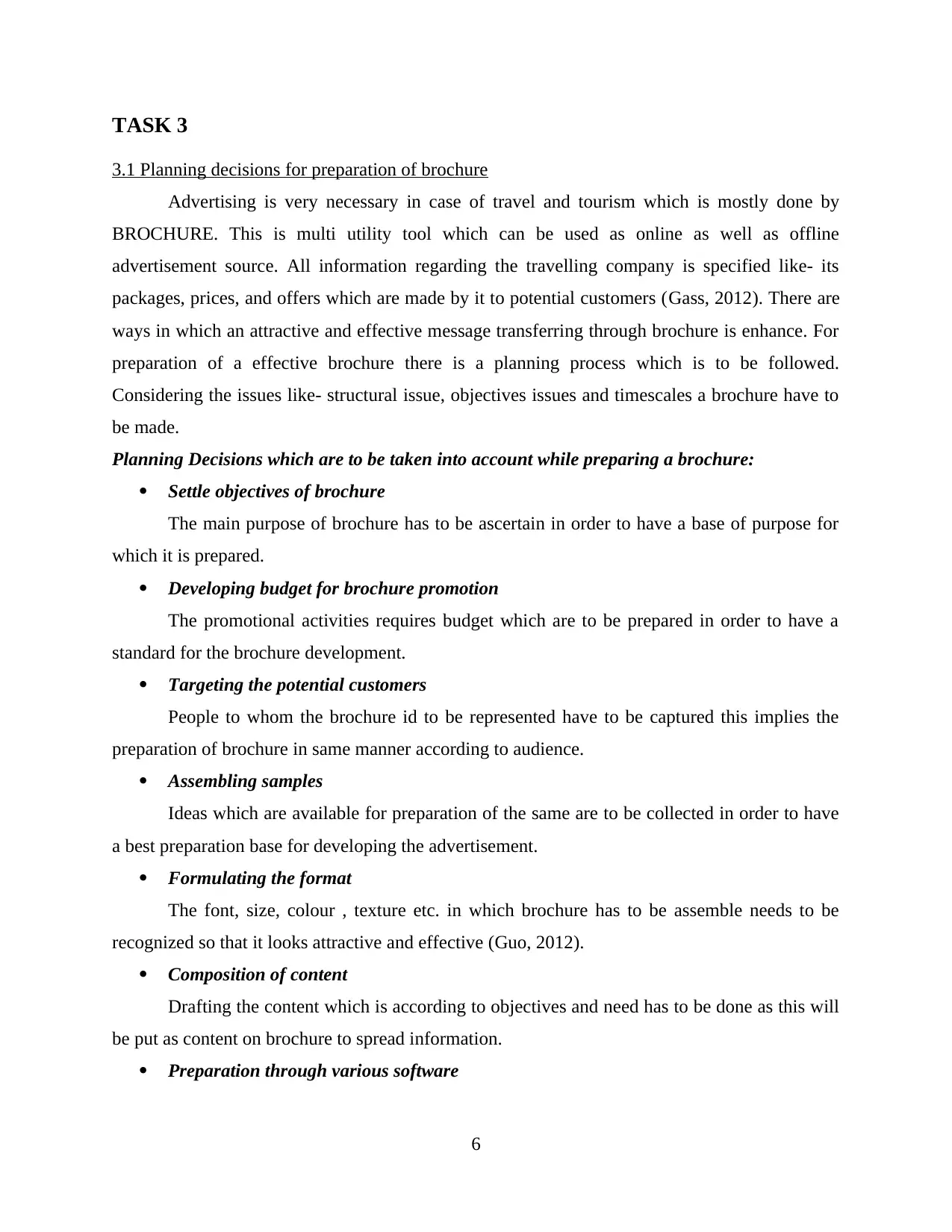
TASK 3
3.1 Planning decisions for preparation of brochure
Advertising is very necessary in case of travel and tourism which is mostly done by
BROCHURE. This is multi utility tool which can be used as online as well as offline
advertisement source. All information regarding the travelling company is specified like- its
packages, prices, and offers which are made by it to potential customers (Gass, 2012). There are
ways in which an attractive and effective message transferring through brochure is enhance. For
preparation of a effective brochure there is a planning process which is to be followed.
Considering the issues like- structural issue, objectives issues and timescales a brochure have to
be made.
Planning Decisions which are to be taken into account while preparing a brochure:
Settle objectives of brochure
The main purpose of brochure has to be ascertain in order to have a base of purpose for
which it is prepared.
Developing budget for brochure promotion
The promotional activities requires budget which are to be prepared in order to have a
standard for the brochure development.
Targeting the potential customers
People to whom the brochure id to be represented have to be captured this implies the
preparation of brochure in same manner according to audience.
Assembling samples
Ideas which are available for preparation of the same are to be collected in order to have
a best preparation base for developing the advertisement.
Formulating the format
The font, size, colour , texture etc. in which brochure has to be assemble needs to be
recognized so that it looks attractive and effective (Guo, 2012).
Composition of content
Drafting the content which is according to objectives and need has to be done as this will
be put as content on brochure to spread information.
Preparation through various software
6
3.1 Planning decisions for preparation of brochure
Advertising is very necessary in case of travel and tourism which is mostly done by
BROCHURE. This is multi utility tool which can be used as online as well as offline
advertisement source. All information regarding the travelling company is specified like- its
packages, prices, and offers which are made by it to potential customers (Gass, 2012). There are
ways in which an attractive and effective message transferring through brochure is enhance. For
preparation of a effective brochure there is a planning process which is to be followed.
Considering the issues like- structural issue, objectives issues and timescales a brochure have to
be made.
Planning Decisions which are to be taken into account while preparing a brochure:
Settle objectives of brochure
The main purpose of brochure has to be ascertain in order to have a base of purpose for
which it is prepared.
Developing budget for brochure promotion
The promotional activities requires budget which are to be prepared in order to have a
standard for the brochure development.
Targeting the potential customers
People to whom the brochure id to be represented have to be captured this implies the
preparation of brochure in same manner according to audience.
Assembling samples
Ideas which are available for preparation of the same are to be collected in order to have
a best preparation base for developing the advertisement.
Formulating the format
The font, size, colour , texture etc. in which brochure has to be assemble needs to be
recognized so that it looks attractive and effective (Guo, 2012).
Composition of content
Drafting the content which is according to objectives and need has to be done as this will
be put as content on brochure to spread information.
Preparation through various software
6
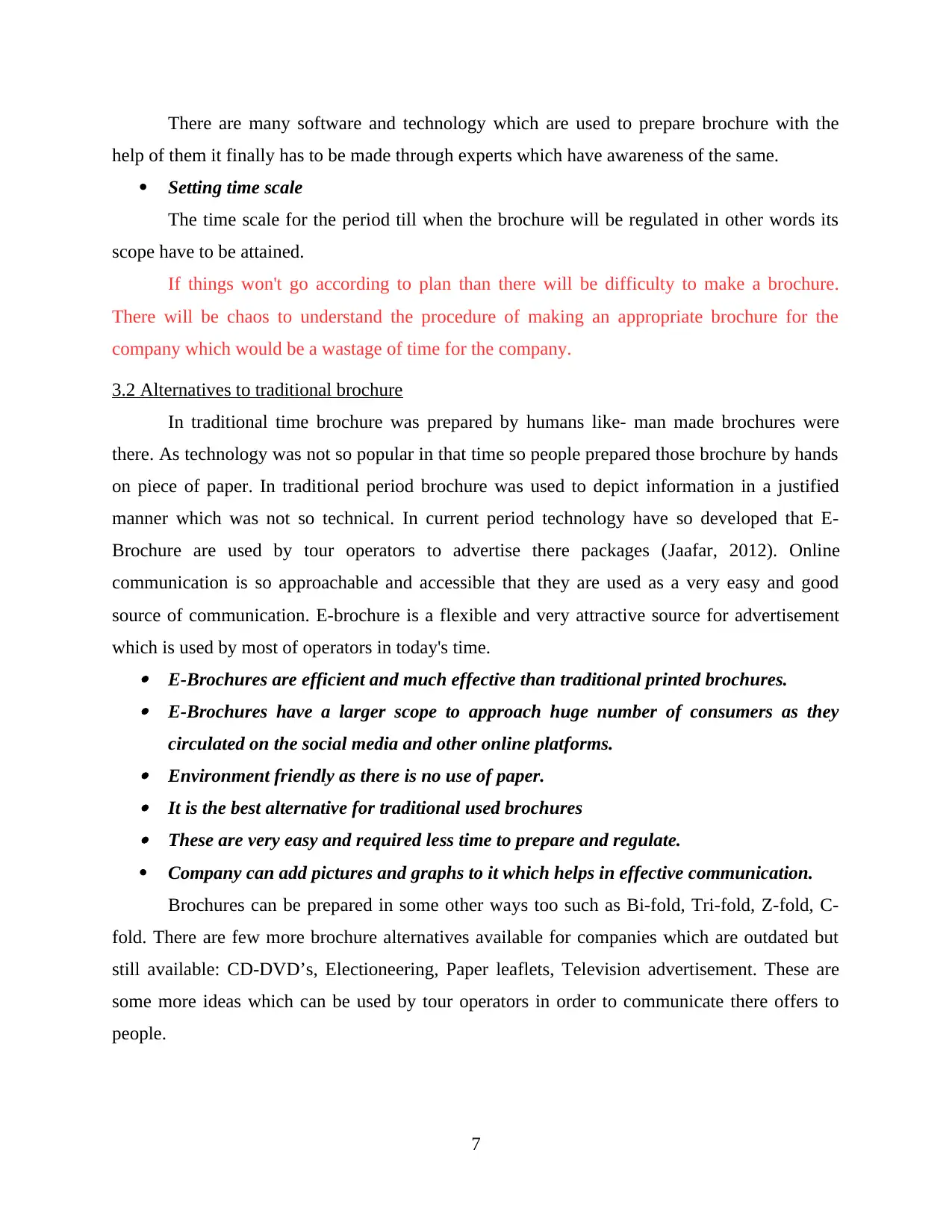
There are many software and technology which are used to prepare brochure with the
help of them it finally has to be made through experts which have awareness of the same.
Setting time scale
The time scale for the period till when the brochure will be regulated in other words its
scope have to be attained.
If things won't go according to plan than there will be difficulty to make a brochure.
There will be chaos to understand the procedure of making an appropriate brochure for the
company which would be a wastage of time for the company.
3.2 Alternatives to traditional brochure
In traditional time brochure was prepared by humans like- man made brochures were
there. As technology was not so popular in that time so people prepared those brochure by hands
on piece of paper. In traditional period brochure was used to depict information in a justified
manner which was not so technical. In current period technology have so developed that E-
Brochure are used by tour operators to advertise there packages (Jaafar, 2012). Online
communication is so approachable and accessible that they are used as a very easy and good
source of communication. E-brochure is a flexible and very attractive source for advertisement
which is used by most of operators in today's time. E-Brochures are efficient and much effective than traditional printed brochures. E-Brochures have a larger scope to approach huge number of consumers as they
circulated on the social media and other online platforms. Environment friendly as there is no use of paper. It is the best alternative for traditional used brochures These are very easy and required less time to prepare and regulate.
Company can add pictures and graphs to it which helps in effective communication.
Brochures can be prepared in some other ways too such as Bi-fold, Tri-fold, Z-fold, C-
fold. There are few more brochure alternatives available for companies which are outdated but
still available: CD-DVD’s, Electioneering, Paper leaflets, Television advertisement. These are
some more ideas which can be used by tour operators in order to communicate there offers to
people.
7
help of them it finally has to be made through experts which have awareness of the same.
Setting time scale
The time scale for the period till when the brochure will be regulated in other words its
scope have to be attained.
If things won't go according to plan than there will be difficulty to make a brochure.
There will be chaos to understand the procedure of making an appropriate brochure for the
company which would be a wastage of time for the company.
3.2 Alternatives to traditional brochure
In traditional time brochure was prepared by humans like- man made brochures were
there. As technology was not so popular in that time so people prepared those brochure by hands
on piece of paper. In traditional period brochure was used to depict information in a justified
manner which was not so technical. In current period technology have so developed that E-
Brochure are used by tour operators to advertise there packages (Jaafar, 2012). Online
communication is so approachable and accessible that they are used as a very easy and good
source of communication. E-brochure is a flexible and very attractive source for advertisement
which is used by most of operators in today's time. E-Brochures are efficient and much effective than traditional printed brochures. E-Brochures have a larger scope to approach huge number of consumers as they
circulated on the social media and other online platforms. Environment friendly as there is no use of paper. It is the best alternative for traditional used brochures These are very easy and required less time to prepare and regulate.
Company can add pictures and graphs to it which helps in effective communication.
Brochures can be prepared in some other ways too such as Bi-fold, Tri-fold, Z-fold, C-
fold. There are few more brochure alternatives available for companies which are outdated but
still available: CD-DVD’s, Electioneering, Paper leaflets, Television advertisement. These are
some more ideas which can be used by tour operators in order to communicate there offers to
people.
7
⊘ This is a preview!⊘
Do you want full access?
Subscribe today to unlock all pages.

Trusted by 1+ million students worldwide
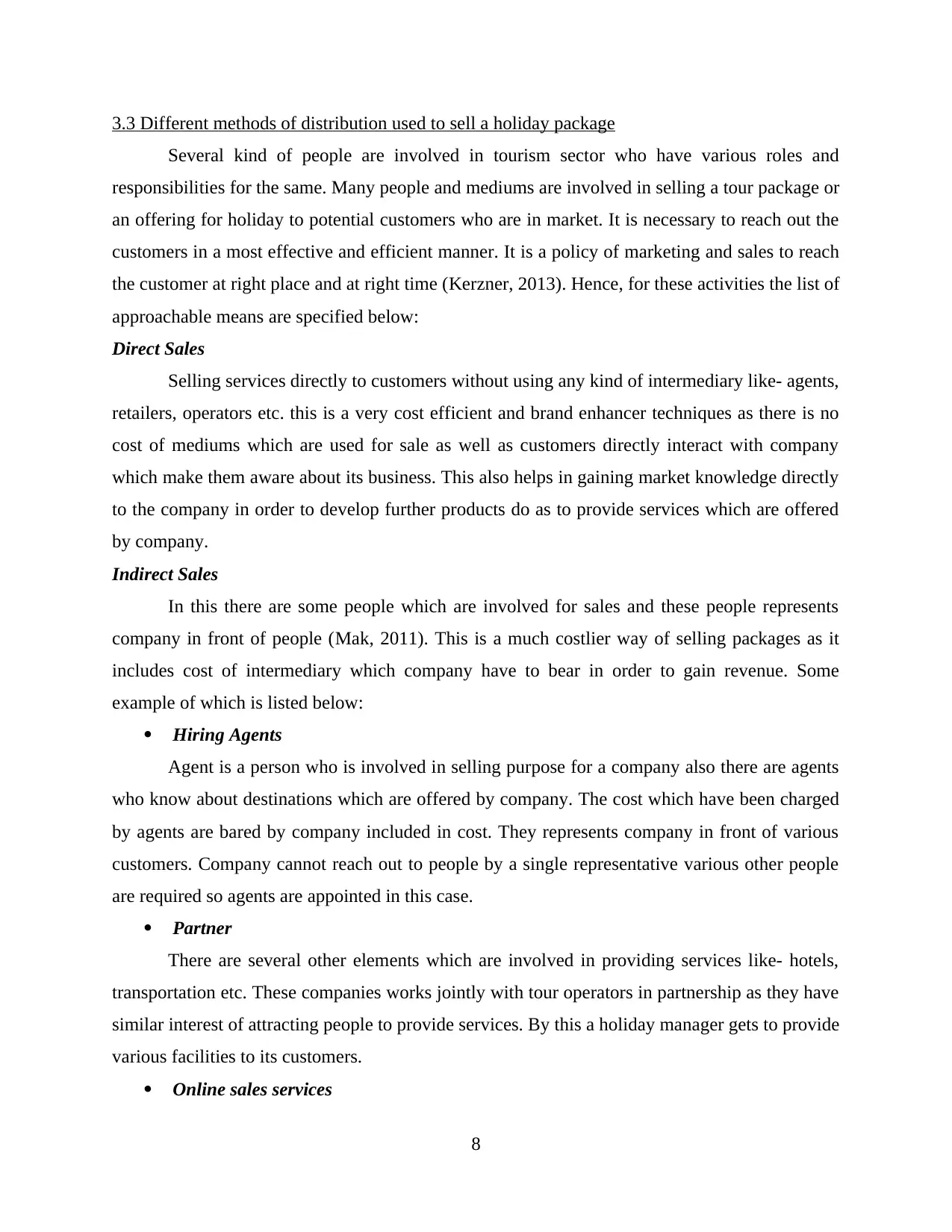
3.3 Different methods of distribution used to sell a holiday package
Several kind of people are involved in tourism sector who have various roles and
responsibilities for the same. Many people and mediums are involved in selling a tour package or
an offering for holiday to potential customers who are in market. It is necessary to reach out the
customers in a most effective and efficient manner. It is a policy of marketing and sales to reach
the customer at right place and at right time (Kerzner, 2013). Hence, for these activities the list of
approachable means are specified below:
Direct Sales
Selling services directly to customers without using any kind of intermediary like- agents,
retailers, operators etc. this is a very cost efficient and brand enhancer techniques as there is no
cost of mediums which are used for sale as well as customers directly interact with company
which make them aware about its business. This also helps in gaining market knowledge directly
to the company in order to develop further products do as to provide services which are offered
by company.
Indirect Sales
In this there are some people which are involved for sales and these people represents
company in front of people (Mak, 2011). This is a much costlier way of selling packages as it
includes cost of intermediary which company have to bear in order to gain revenue. Some
example of which is listed below:
Hiring Agents
Agent is a person who is involved in selling purpose for a company also there are agents
who know about destinations which are offered by company. The cost which have been charged
by agents are bared by company included in cost. They represents company in front of various
customers. Company cannot reach out to people by a single representative various other people
are required so agents are appointed in this case.
Partner
There are several other elements which are involved in providing services like- hotels,
transportation etc. These companies works jointly with tour operators in partnership as they have
similar interest of attracting people to provide services. By this a holiday manager gets to provide
various facilities to its customers.
Online sales services
8
Several kind of people are involved in tourism sector who have various roles and
responsibilities for the same. Many people and mediums are involved in selling a tour package or
an offering for holiday to potential customers who are in market. It is necessary to reach out the
customers in a most effective and efficient manner. It is a policy of marketing and sales to reach
the customer at right place and at right time (Kerzner, 2013). Hence, for these activities the list of
approachable means are specified below:
Direct Sales
Selling services directly to customers without using any kind of intermediary like- agents,
retailers, operators etc. this is a very cost efficient and brand enhancer techniques as there is no
cost of mediums which are used for sale as well as customers directly interact with company
which make them aware about its business. This also helps in gaining market knowledge directly
to the company in order to develop further products do as to provide services which are offered
by company.
Indirect Sales
In this there are some people which are involved for sales and these people represents
company in front of people (Mak, 2011). This is a much costlier way of selling packages as it
includes cost of intermediary which company have to bear in order to gain revenue. Some
example of which is listed below:
Hiring Agents
Agent is a person who is involved in selling purpose for a company also there are agents
who know about destinations which are offered by company. The cost which have been charged
by agents are bared by company included in cost. They represents company in front of various
customers. Company cannot reach out to people by a single representative various other people
are required so agents are appointed in this case.
Partner
There are several other elements which are involved in providing services like- hotels,
transportation etc. These companies works jointly with tour operators in partnership as they have
similar interest of attracting people to provide services. By this a holiday manager gets to provide
various facilities to its customers.
Online sales services
8
Paraphrase This Document
Need a fresh take? Get an instant paraphrase of this document with our AI Paraphraser
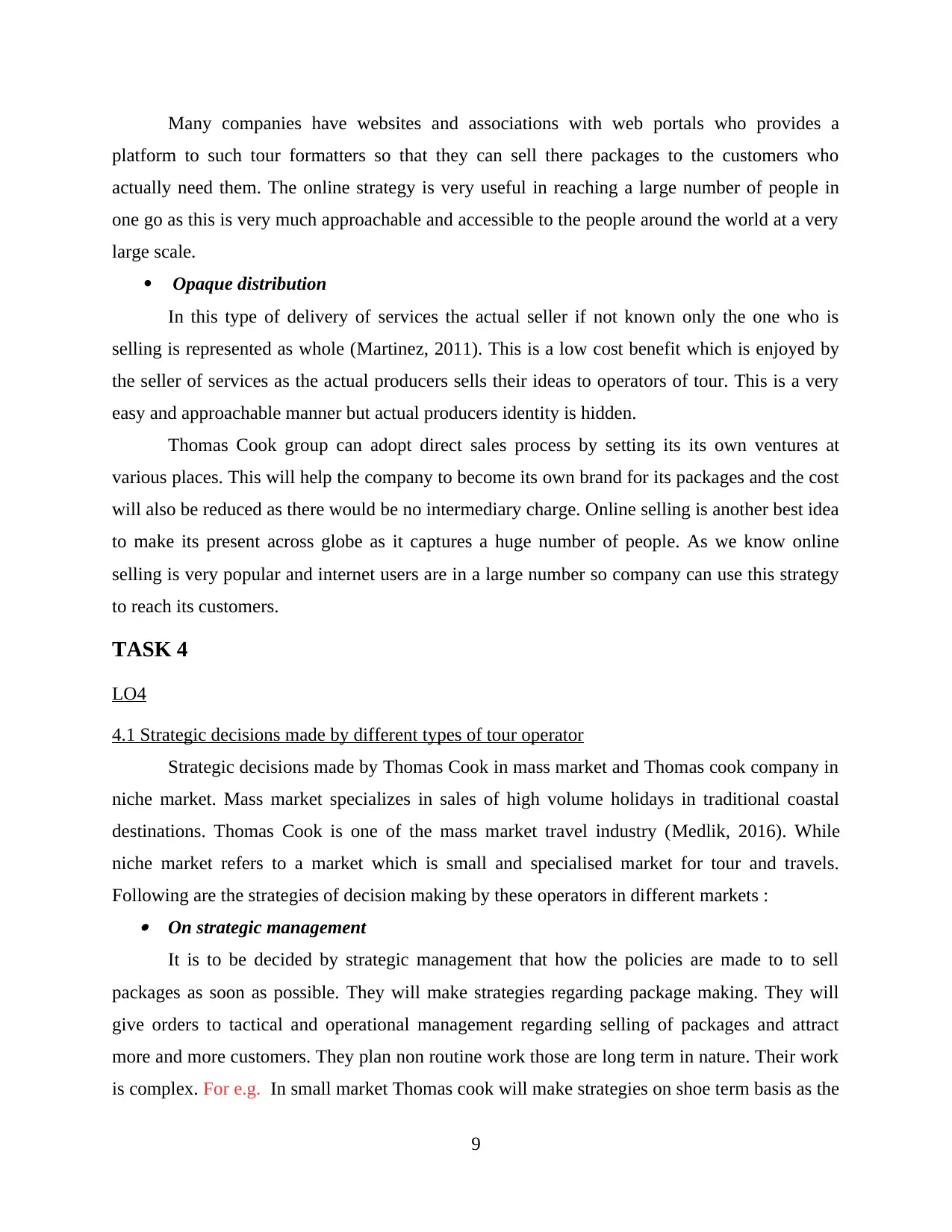
Many companies have websites and associations with web portals who provides a
platform to such tour formatters so that they can sell there packages to the customers who
actually need them. The online strategy is very useful in reaching a large number of people in
one go as this is very much approachable and accessible to the people around the world at a very
large scale.
Opaque distribution
In this type of delivery of services the actual seller if not known only the one who is
selling is represented as whole (Martinez, 2011). This is a low cost benefit which is enjoyed by
the seller of services as the actual producers sells their ideas to operators of tour. This is a very
easy and approachable manner but actual producers identity is hidden.
Thomas Cook group can adopt direct sales process by setting its its own ventures at
various places. This will help the company to become its own brand for its packages and the cost
will also be reduced as there would be no intermediary charge. Online selling is another best idea
to make its present across globe as it captures a huge number of people. As we know online
selling is very popular and internet users are in a large number so company can use this strategy
to reach its customers.
TASK 4
LO4
4.1 Strategic decisions made by different types of tour operator
Strategic decisions made by Thomas Cook in mass market and Thomas cook company in
niche market. Mass market specializes in sales of high volume holidays in traditional coastal
destinations. Thomas Cook is one of the mass market travel industry (Medlik, 2016). While
niche market refers to a market which is small and specialised market for tour and travels.
Following are the strategies of decision making by these operators in different markets : On strategic management
It is to be decided by strategic management that how the policies are made to to sell
packages as soon as possible. They will make strategies regarding package making. They will
give orders to tactical and operational management regarding selling of packages and attract
more and more customers. They plan non routine work those are long term in nature. Their work
is complex. For e.g. In small market Thomas cook will make strategies on shoe term basis as the
9
platform to such tour formatters so that they can sell there packages to the customers who
actually need them. The online strategy is very useful in reaching a large number of people in
one go as this is very much approachable and accessible to the people around the world at a very
large scale.
Opaque distribution
In this type of delivery of services the actual seller if not known only the one who is
selling is represented as whole (Martinez, 2011). This is a low cost benefit which is enjoyed by
the seller of services as the actual producers sells their ideas to operators of tour. This is a very
easy and approachable manner but actual producers identity is hidden.
Thomas Cook group can adopt direct sales process by setting its its own ventures at
various places. This will help the company to become its own brand for its packages and the cost
will also be reduced as there would be no intermediary charge. Online selling is another best idea
to make its present across globe as it captures a huge number of people. As we know online
selling is very popular and internet users are in a large number so company can use this strategy
to reach its customers.
TASK 4
LO4
4.1 Strategic decisions made by different types of tour operator
Strategic decisions made by Thomas Cook in mass market and Thomas cook company in
niche market. Mass market specializes in sales of high volume holidays in traditional coastal
destinations. Thomas Cook is one of the mass market travel industry (Medlik, 2016). While
niche market refers to a market which is small and specialised market for tour and travels.
Following are the strategies of decision making by these operators in different markets : On strategic management
It is to be decided by strategic management that how the policies are made to to sell
packages as soon as possible. They will make strategies regarding package making. They will
give orders to tactical and operational management regarding selling of packages and attract
more and more customers. They plan non routine work those are long term in nature. Their work
is complex. For e.g. In small market Thomas cook will make strategies on shoe term basis as the
9
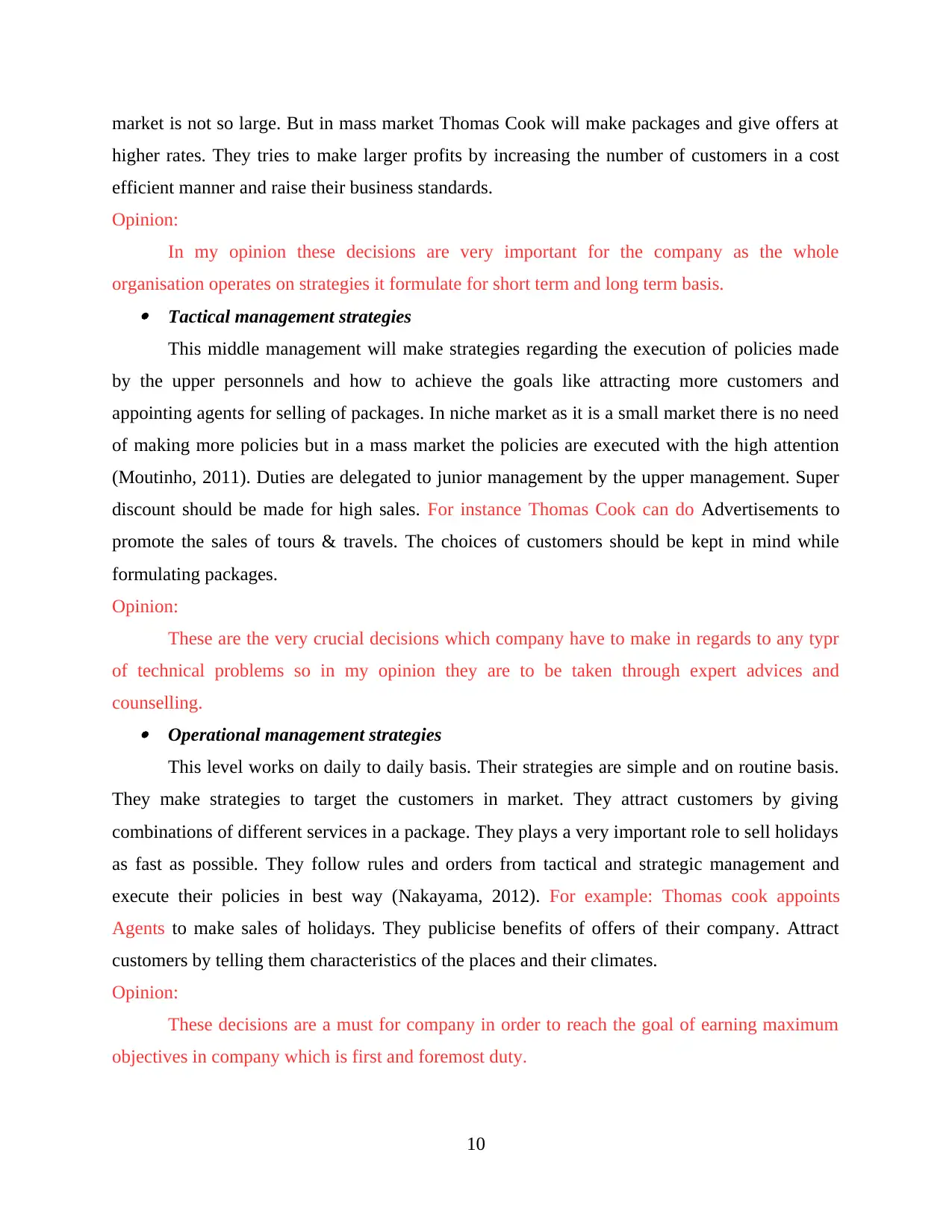
market is not so large. But in mass market Thomas Cook will make packages and give offers at
higher rates. They tries to make larger profits by increasing the number of customers in a cost
efficient manner and raise their business standards.
Opinion:
In my opinion these decisions are very important for the company as the whole
organisation operates on strategies it formulate for short term and long term basis. Tactical management strategies
This middle management will make strategies regarding the execution of policies made
by the upper personnels and how to achieve the goals like attracting more customers and
appointing agents for selling of packages. In niche market as it is a small market there is no need
of making more policies but in a mass market the policies are executed with the high attention
(Moutinho, 2011). Duties are delegated to junior management by the upper management. Super
discount should be made for high sales. For instance Thomas Cook can do Advertisements to
promote the sales of tours & travels. The choices of customers should be kept in mind while
formulating packages.
Opinion:
These are the very crucial decisions which company have to make in regards to any typr
of technical problems so in my opinion they are to be taken through expert advices and
counselling. Operational management strategies
This level works on daily to daily basis. Their strategies are simple and on routine basis.
They make strategies to target the customers in market. They attract customers by giving
combinations of different services in a package. They plays a very important role to sell holidays
as fast as possible. They follow rules and orders from tactical and strategic management and
execute their policies in best way (Nakayama, 2012). For example: Thomas cook appoints
Agents to make sales of holidays. They publicise benefits of offers of their company. Attract
customers by telling them characteristics of the places and their climates.
Opinion:
These decisions are a must for company in order to reach the goal of earning maximum
objectives in company which is first and foremost duty.
10
higher rates. They tries to make larger profits by increasing the number of customers in a cost
efficient manner and raise their business standards.
Opinion:
In my opinion these decisions are very important for the company as the whole
organisation operates on strategies it formulate for short term and long term basis. Tactical management strategies
This middle management will make strategies regarding the execution of policies made
by the upper personnels and how to achieve the goals like attracting more customers and
appointing agents for selling of packages. In niche market as it is a small market there is no need
of making more policies but in a mass market the policies are executed with the high attention
(Moutinho, 2011). Duties are delegated to junior management by the upper management. Super
discount should be made for high sales. For instance Thomas Cook can do Advertisements to
promote the sales of tours & travels. The choices of customers should be kept in mind while
formulating packages.
Opinion:
These are the very crucial decisions which company have to make in regards to any typr
of technical problems so in my opinion they are to be taken through expert advices and
counselling. Operational management strategies
This level works on daily to daily basis. Their strategies are simple and on routine basis.
They make strategies to target the customers in market. They attract customers by giving
combinations of different services in a package. They plays a very important role to sell holidays
as fast as possible. They follow rules and orders from tactical and strategic management and
execute their policies in best way (Nakayama, 2012). For example: Thomas cook appoints
Agents to make sales of holidays. They publicise benefits of offers of their company. Attract
customers by telling them characteristics of the places and their climates.
Opinion:
These decisions are a must for company in order to reach the goal of earning maximum
objectives in company which is first and foremost duty.
10
⊘ This is a preview!⊘
Do you want full access?
Subscribe today to unlock all pages.

Trusted by 1+ million students worldwide
1 out of 15
Related Documents
Your All-in-One AI-Powered Toolkit for Academic Success.
+13062052269
info@desklib.com
Available 24*7 on WhatsApp / Email
![[object Object]](/_next/static/media/star-bottom.7253800d.svg)
Unlock your academic potential
Copyright © 2020–2026 A2Z Services. All Rights Reserved. Developed and managed by ZUCOL.





